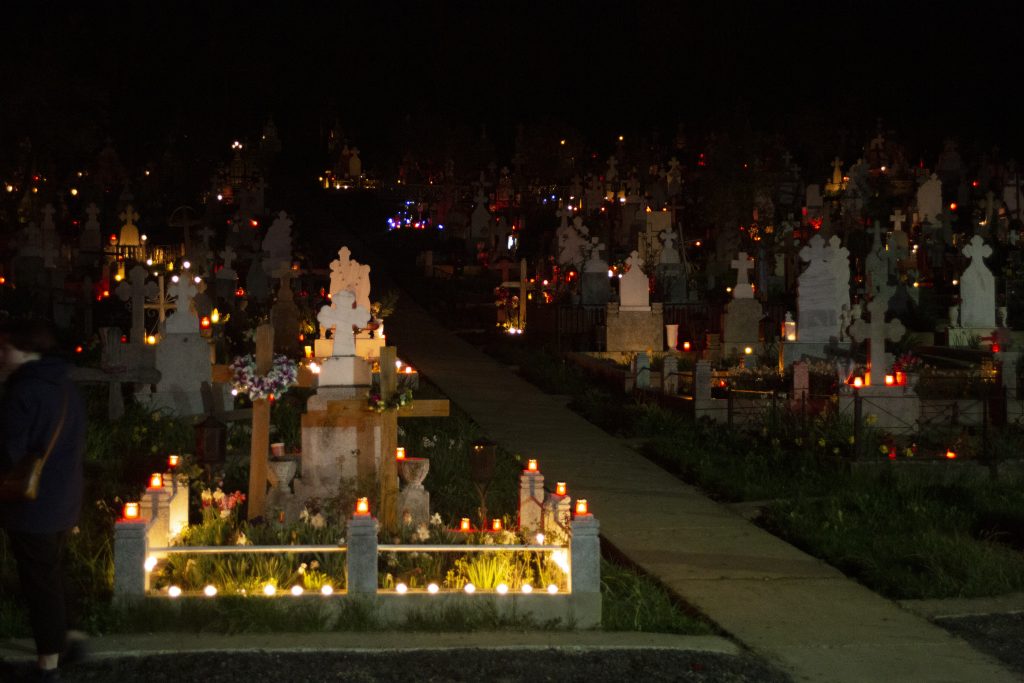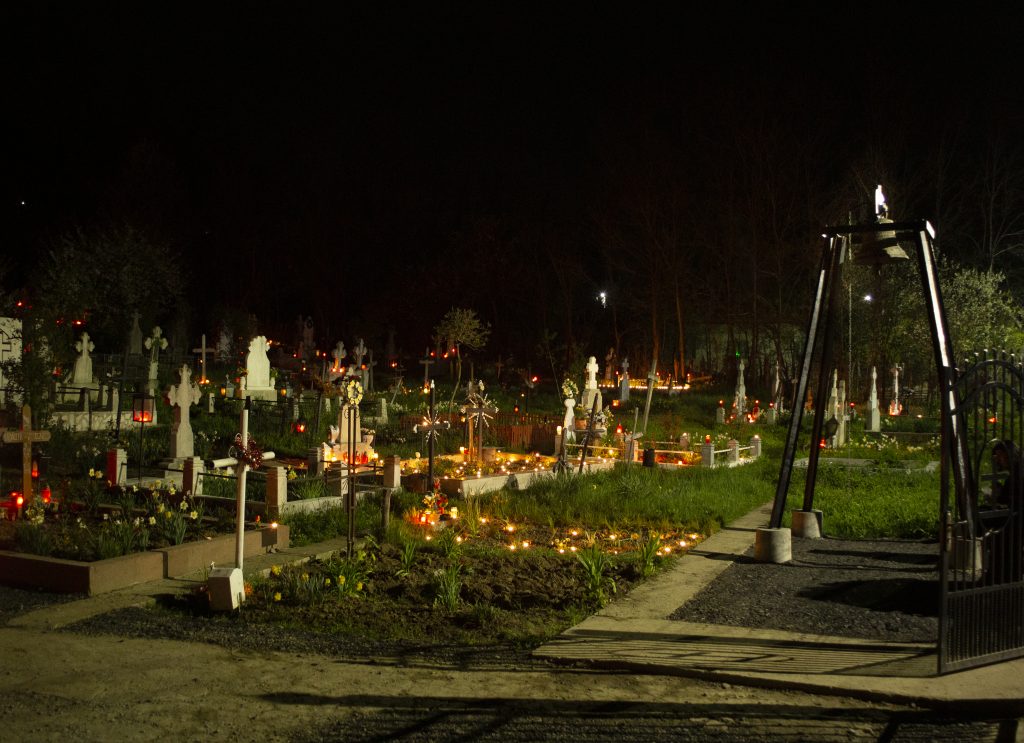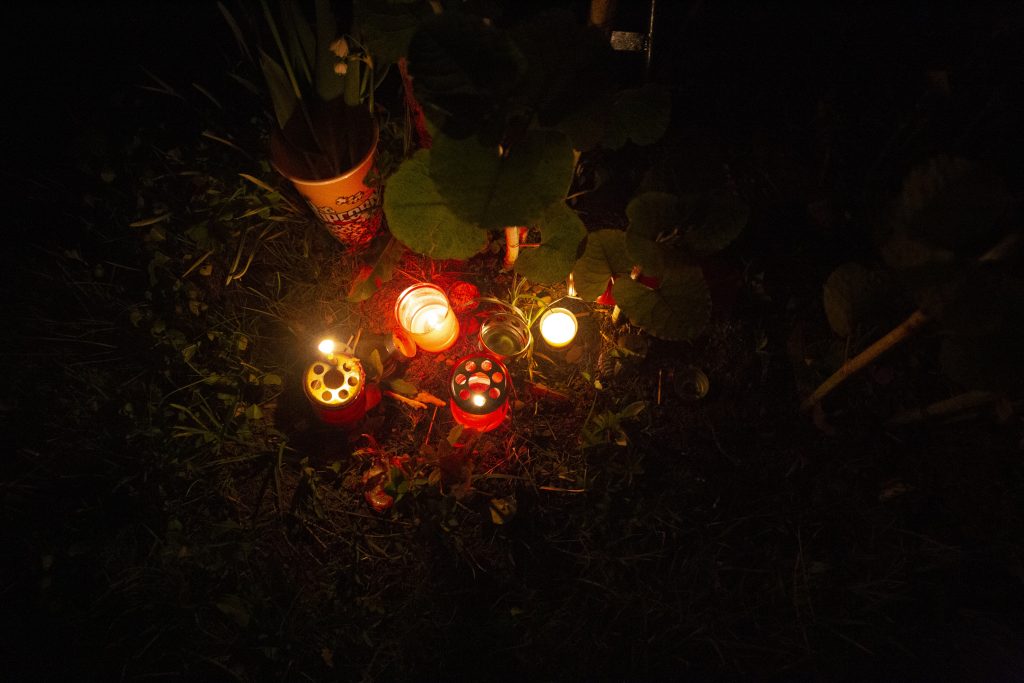Portret de voluntar – Emma (Franța)
Hello everyone !
I’m Emma from Nancy (a city in the east of France) and I arrived at Schiulesti a few days ago for my quarantine time. Can’t wait to start more with Curba and meet you! By the way, I’m 23 years old, currently on a gap year break from my food science studies. I wanted to have other experiences, more at the human / social level, so before arriving here I had a civic service with an interfaith association whose aim is to make people from different convictions meet, I also started learning spanish 🙂 I’m into hiking, climbing and cooking as well (and eating afterwards) so it’s very likely that I’ll ask you for some recipes! So here I’m in Romania, it’s my first time in this country and I will be there for a volunteering of 2 months. I’ll get to do activities with young people at the youth center and with the tina mobile among the other activities I’ll do here.
See you soon! A bientôt!
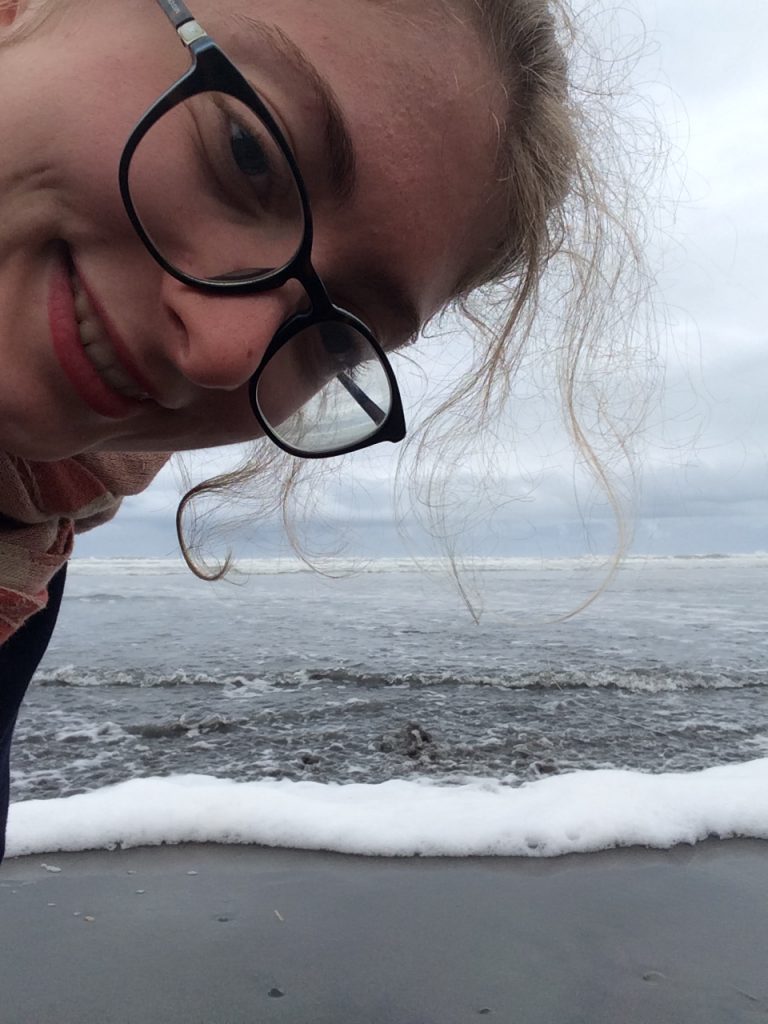
Bună tuturor!
Sunt Emma din Nancy (un oraș din estul Franței) și am ajuns în Schiulești acum câteva zile pe timp de carantină. Deabia aștept să incep mai multe activități la Curba și să vă cunosc! Am 23 ani, momentan într-un an liber de la Facultatea de Științe Alimentare. Am vrut ca să am și alte experiențe, mai mult orientate spre social așa încat înainte să ajung aici am fost voluntară la un serviciu civic ce este o asociație interreligioasă a cărui scop este sa facă oamenii din diferite confesiuni să se întâlnească. Deasemenea vorbesc spaniolă 🙂 Îmi place de asemenea să merg în drumeții, cățărari și să gătesc (dar și să mănânc) deci este foarte posibil să vă cer rețete! Așadar, aici sunt, în România, este prima mea dată în această țară și voi fi aici pentru 2 luni. Voi avea ocazia să lucrez cu tineri la Centrul de tineret și să merg cu autorulota printre alte activități ce vor fii aici.
Ne vedem curand! A bientôt!
Portret de voluntar – Ravaka (Franţa)
Hello ! My name is Ravaka. I am 25 years old and I come from France. I love listening to music so this is what I do most of the time when I’m by myself. I am passionate about South Korea and some other countries in Asia such as Japan and Thaïland… I am curious about History and Cultures of the world in general. I like speaking and learning foreign languages. I also very much enjoy learning about the different ways of living and the customs there are in the world. This is one of the reasons I love traveling. Another reason is that I am a bit adventurous.
Being able to live and grow in an unknown environment is the main reason I decided to involve myself in a volunteering project abroad. It is a way of challenging myself which I felt I needed to do. Then I find it very motivating to be working with other young people on a project that would benefit many people. Since I have never done anything like this before, except from some volunteering work as a student, I found that a 2 months volunteering project was right for me to start my volunteering journey. Also, I heard we could go hiking and I can’t wait to do that !
I hope this experience will be positive and I feel grateful to be here in this year of 2021.

Buna ! Numele meu este Ravaka. Am 25 de ani și vin din Franța. Îmi place să ascult muzică, așa că fac asta de cele mai multe ori când sunt singur. Sunt pasionat de Coreea de Sud și de alte țări din Asia, cum ar fi Japonia și Thailanda … Sunt curios de Istoria și Culturile lumii în general. Îmi place să vorbesc și să învăț limbi străine. De asemenea, îmi place foarte mult să învăț despre diferitele moduri de viață și obiceiurile care există în lume. Acesta este unul dintre motivele pentru care îmi place să călătoresc. Un alt motiv este că sunt un pic aventuros.
A putea trăi și crește într-un mediu necunoscut este principalul motiv pentru care am decis să mă implic într-un proiect de voluntariat în străinătate. Este un mod de a mă provoca pe mine, pe care am simțit că trebuie să îl fac. Apoi mi se pare foarte motivant să lucrez cu alți tineri la un proiect care ar aduce beneficii multor oameni. Din moment ce nu am mai făcut așa ceva, cu excepția unor activități de voluntariat ca student, am constatat că un proiect de voluntariat de 2 luni mi-a fost potrivit pentru a-mi începe călătoria de voluntariat. De asemenea, am auzit că putem face drumeții și abia aștept să fac asta!
Sper că această experiență va fi pozitivă și sunt recunoscător să fiu aici în acest an din 2021.
Easter in Teișani
Această reflecție asupra sărbătorilor pascale a fost pregătită în comun de Josué și Gertrudis, voluntarii noștri din Spania din cadrul proiectului Discover Teișani. Tradus de Alex Popa.
Chiar dacă România face parte din Europa și în unele aspecte nu atât de diferită de țara noastră, in același timp ai senzația de a fi într-o realitate ieșita din comun. Ca exemplu, odată cu Paștele întâlnim – cea mai mare sărbătoare creștină – sentimentul este că probabil ați mai văzut un lucru asemănător, dar este în același timp unul deosebit, deoarece biserica de aici este o biserica ortodoxă, se aseamănă celei catolice, care este cea cu care noi suntem obișnuiți. Aceasta este prima noastră experiență cu partea necunoscuta de noi a creștinismului.Am avut oportunitatea sa ne bucuram pentru prima oara de Pastele Tradițional Romanesc in satele Teișani si Olteni. Am fost anunțați ca aici festivitatea Paștelui este urmat de vechiul calendar ortodox, asta înseamna ca anul acesta, Duminica Învierii a fost situata pe 25 aprilie.
Prin urmare, este un lucru în comun să vedem cum familiile se pregătesc pentru această zi prin fierberea ouălor și prin colorarea lor cu vopsea specială pentru coajă ouălor.Am descoperit procesul alături de un voluntar local care ne-a explicat că vopsirea ouălor poate fi realizată și prin utilizarea cepei. Alegerea culorii roșii este cea mai comună, deoarece evocă sângele lui Isus Hristos.
Joia, vinerea și sâmbătă, înainte de Duminică Învierii, are loc o slujba dedicată Paștelui. Joi, liturghia este mult mai lungă decât de obicei, preotul citește cele 12 povești ale Evangheliei, câte unul pentru fiecare apostol. Am luat parte la această liturghie și a fost interesant cum a trebuit să “reînvățăm” procesul bunelor maniere din biserica datorită faptului că sunt total diferite de cele pe care le urmăm în țară fiecărui dintre noi. Din fericire am avut un localnic dornic cu noi explicând tot ceea ce aveam nevoie să știm pentru nu arată prea mult străini ;). La final, noi și restul oamenilor am primit o sticlă de suc de portocale pentru această ocazie excepțională.
Cea mai impresionantă zi pentru noi a fost sâmbătă. La începutul liturghiei, care începe în jurul orei 12 noaptea, oamenii cântă și împart focul lumânărilor pentru a le aprinde, începând cu lumânarea mare pe care o ține preotul. După un timp, oamenii merg la cimitir cu lumânările lor și le lasă acolo. Este momentul să petrecem câteva minute amintindu-ne de strămoșii lor care au murit. De dată această în cimitir merg să își amintească de oamenii care au fost aproape de ei, însă aici nu mai este vedere doar sărbătoarea de Paști cum suntem obișnuiți noi în Spania. Chiar și pentru unii români cu care am vorbit, care nu sunt din comună, este curios. În plus, putem spune că rezultatul merită văzut și este locul unde ne punem eforturile pentru a surprinde magia acestui moment, la biserica.
Am insotit o familie in cimitirul Teișani în acel moment. Încă auzeam sunetul oamenilor cântând în biserică. Apoi, ne-am întors și slujba s-a terminat pe la 02:30. Cu toate acestea, slujba obișnuia să se termine mai târziu, dar de data aceasta pentru măsurile Covid au terminat totul putin mai devreme.
De-a lungul nopții ne-am dat seama de faptul că nu văzusem cu adevărat comună Teișani noaptea până atunci din cauza stării de urgență. În această zi Teisani, a fost aglomerat dacă l-am compară cu restul zilelor ale acestui an. A fost frumos să vedem tineri stand în jurul nostru vorbind pentru a profită de ocazia specială care ne aduce aici.
A fost cu adevărat impresionant și să rămânem în cimitirul din Olteni mai târziu, acolo nu era nimeni și era foarte liniște. De la această liturghie și timp de 40 de zile, este obișnuit că oamenii să se întâmpine cu «Hristos a Înviat!» și ei răspund cu «Adevărat un înviat!».
Even if Romania is part of Europe and in some aspects not that different from our country, at the same time you have the feeling of being in a different reality. For example, with Easter – the biggest Christian celebration – the feeling is that you have seen this before but it is at the same time different since the one here is the Orthodox churchunlike the Catholic one which is the one we are used to. This is our first experience with the astern part of the Christianism.
We had the opportunity of enjoying Romanian Easter for the first time in the villages of Teișani and Olteni. We have been informed that Easter festivity follows here the old Orthodox calendar, which means that this year the Resurrection Sunday, the most important day for this fest, was on the 25th of April.
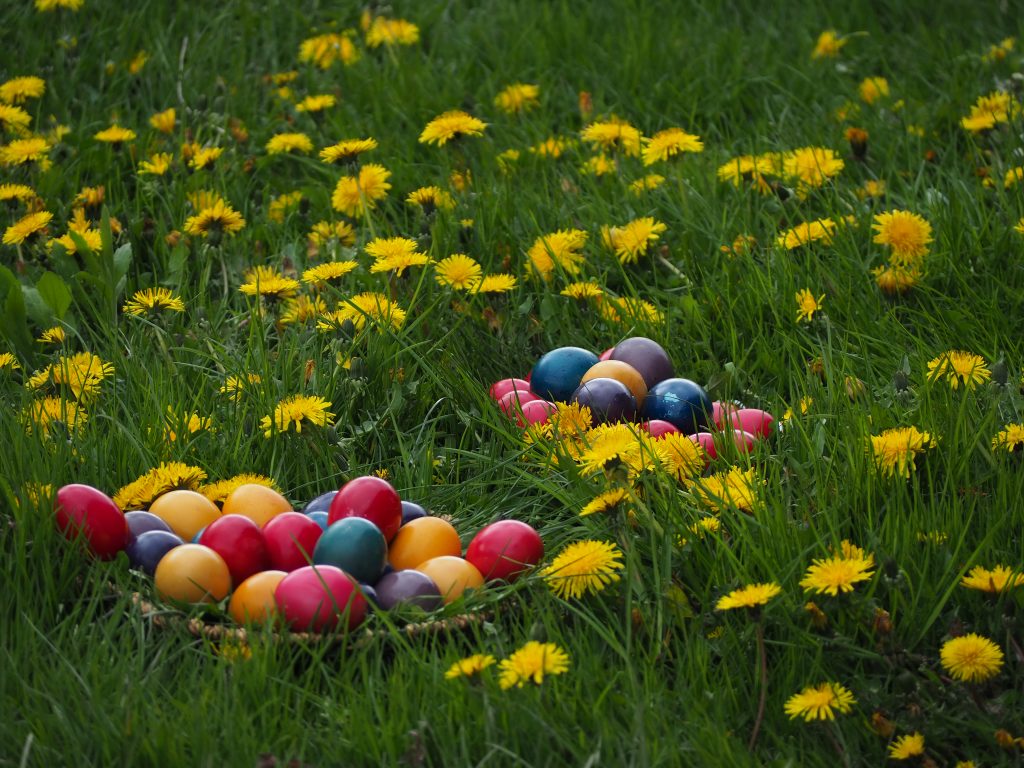
Therefore, it is common to see how families prepare for that day by dying boiled eggs with special ink for the shell of the eggs. We discovered the process with a local volunteer that explained to us that the dying can also be made with onions. The red choice for the eggs is the most common because it evokes the blood of Christ.
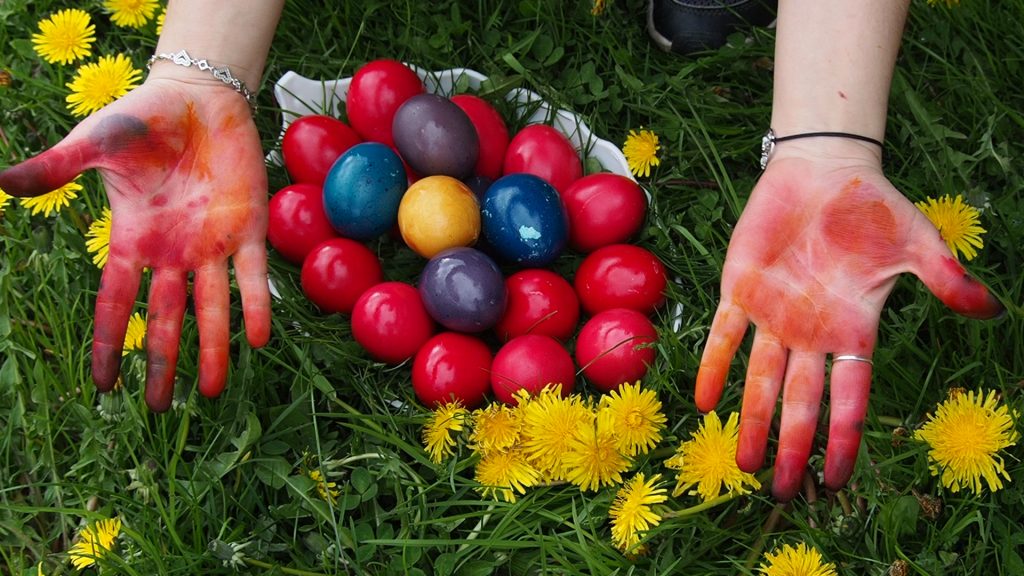
On Thursday, Friday and Saturday before the Resurrection Sunday, there are special mass. On Thursday, the mass is longer than usual, the priest reads twelvefold of the gospel, one for each apostle. We visited that mass and it was interesting how we had to “relearn” the process and manners in the church due to they are different from the ones we used to follow in our country. Luckily we had a local with us explaining all what we needed to know not too look too much like foreigners ;). At the end, we and the rest of people received a bottle of orange juice for this exceptional occasion.
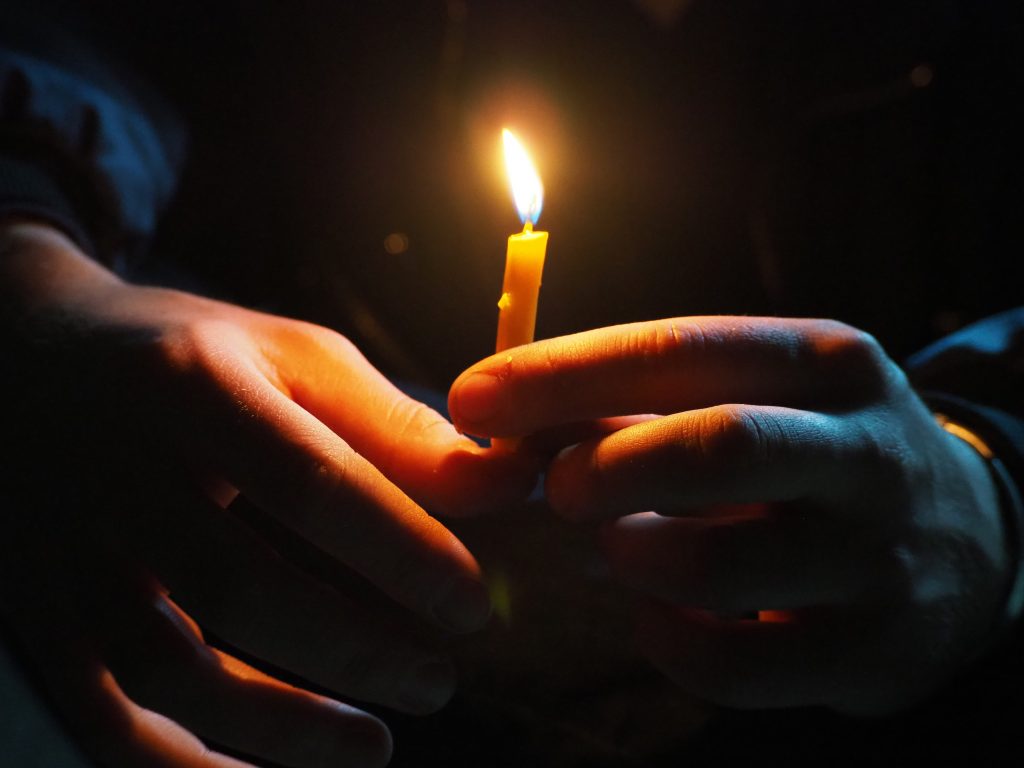
The most impressive day for us was Saturday. At the beginning of the mass, which starts about 12h in the night, people sing and share the fire of their candles to light them up, starting with the big candle that the priest holds. After a while, people go to the cemetery with their candles and they let them there. It is the moment to spent some minutes remembering their ancestors who passed away. This time in the cemetery to think about the people who were close to us but are not anymore is not sight in the Easter fest that we are used to in Spain. Even for some Romanians who we have talked with but are not from the commune it is curious. Besides, we can say that the result is worthwhile to see, and it is where we put our efforts to capture the magic of this moment.
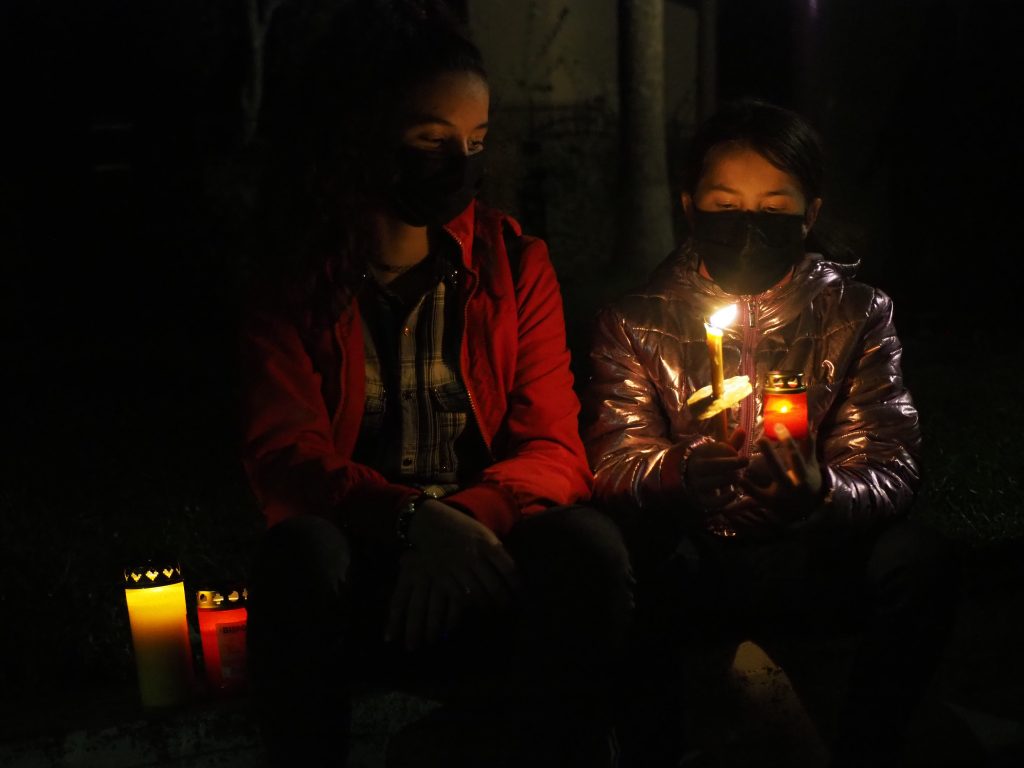
We acompannied a family to the Teișani’s cementery in that moment. We could hear still the sound of people singing in the church. Then, we came back and the mass finished about 2:30h. Nevertheless, the mass used to finish later, but this time for Covid measures they finished earlier.
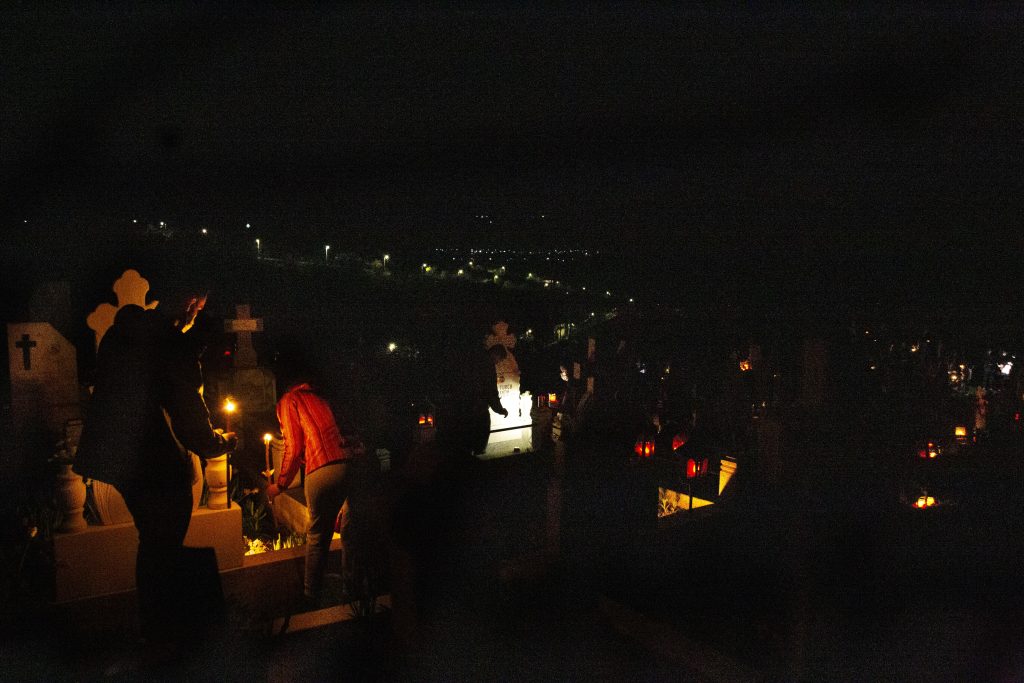
Along the night we realised the fact that we had not really seen Teișani at night until then because of the curfew. This day Teisani was crowded if we compare it with the rest of this year. It was nice to see young people hanging around taking profit from the special occasion that brings us here.
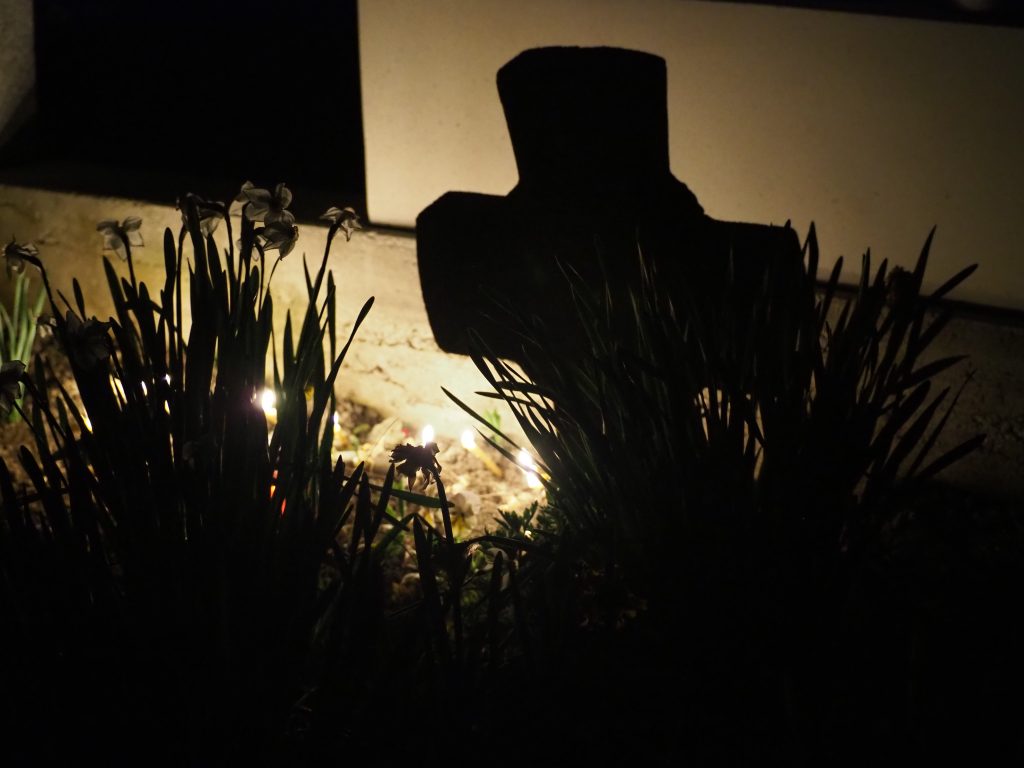
It was really impressive also to stay in the cementery of Olteni later, were there was no one and it was really quiet. From this mass and during 40 days, is common that people greets themselves with «Hristos a Înviat!» (Christ has risen) and they answer «Adevărat a înviat!» (Indeed he has risen).
